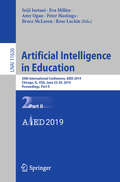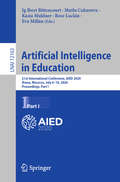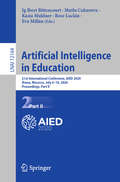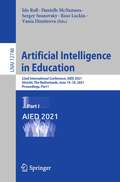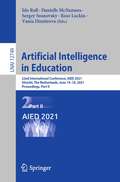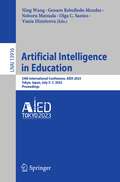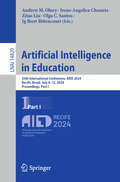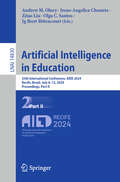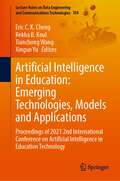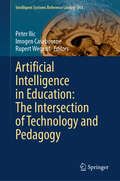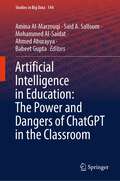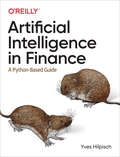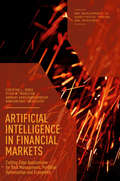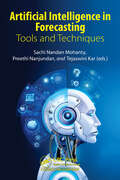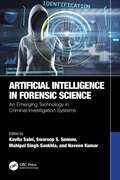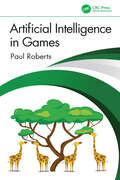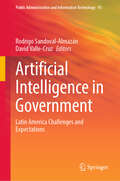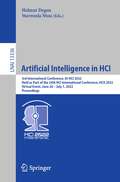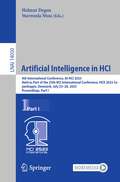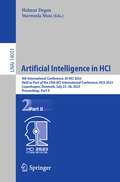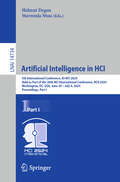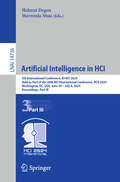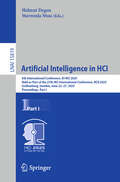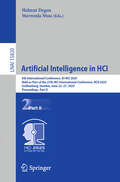- Table View
- List View
Artificial Intelligence in Education: 20th International Conference, AIED 2019, Chicago, IL, USA, June 25-29, 2019, Proceedings, Part II (Lecture Notes in Computer Science #11626)
by Rose Luckin Bruce McLaren Seiji Isotani Eva Millán Amy Ogan Peter HastingsThis two-volume set LNCS 11625 and 11626 constitutes the refereed proceedings of the 20th International Conference on Artificial Intelligence in Education, AIED 2019, held in Chicago, IL, USA, in June 2019. The 45 full papers presented together with 41 short, 10 doctoral consortium, 6 industry, and 10 workshop papers were carefully reviewed and selected from 177 submissions. AIED 2019 solicits empirical and theoretical papers particularly in the following lines of research and application: Intelligent and interactive technologies in an educational context; Modelling and representation; Models of teaching and learning; Learning contexts and informal learning; Evaluation; Innovative applications; Intelligent techniques to support disadvantaged schools and students, inequity and inequality in education.
Artificial Intelligence in Education: 21st International Conference, AIED 2020, Ifrane, Morocco, July 6–10, 2020, Proceedings, Part I (Lecture Notes in Computer Science #12163)
by Rose Luckin Ig Ibert Bittencourt Eva Millán Mutlu Cukurova Kasia MuldnerThis two-volume set LNAI 12163 and 12164 constitutes the refereed proceedings of the 21th International Conference on Artificial Intelligence in Education, AIED 2020, held in Ifrane, Morocco, in July 2020.*The 49 full papers presented together with 66 short, 4 industry & innovation, 4 doctoral consortium, and 4 workshop papers were carefully reviewed and selected from 214 submissions. The conference provides opportunities for the cross-fertilization of approaches, techniques and ideas from the many fields that comprise AIED, including computer science, cognitive and learning sciences, education, game design, psychology, sociology, linguistics as well as many domain-specific areas. *The conference was held virtually due to the COVID-19 pandemic.
Artificial Intelligence in Education: 21st International Conference, AIED 2020, Ifrane, Morocco, July 6–10, 2020, Proceedings, Part II (Lecture Notes in Computer Science #12164)
by Rose Luckin Ig Ibert Bittencourt Eva Millán Mutlu Cukurova Kasia MuldnerThis two-volume set LNAI 12163 and 12164 constitutes the refereed proceedings of the 21th International Conference on Artificial Intelligence in Education, AIED 2020, held in Ifrane, Morocco, in July 2020.* The 49 full papers presented together with 66 short, 4 industry & innovation, 4 doctoral consortium, and 4 workshop papers were carefully reviewed and selected from 214 submissions. The conference provides opportunities for the cross-fertilization of approaches, techniques and ideas from the many fields that comprise AIED, including computer science, cognitive and learning sciences, education, game design, psychology, sociology, linguistics as well as many domain-specific areas. *The conference was held virtually due to the COVID-19 pandemic.
Artificial Intelligence in Education: 22nd International Conference, AIED 2021, Utrecht, The Netherlands, June 14–18, 2021, Proceedings, Part I (Lecture Notes in Computer Science #12748)
by Sergey Sosnovsky Rose Luckin Vania Dimitrova Ido Roll Danielle McNamaraThis two-volume set LNAI 12748 and 12749 constitutes the refereed proceedings of the 22nd International Conference on Artificial Intelligence in Education, AIED 2021, held in Utrecht, The Netherlands, in June 2021.*The 40 full papers presented together with 76 short papers, 2 panels papers, 4 industry papers, 4 doctoral consortium, and 6 workshop papers were carefully reviewed and selected from 209 submissions. The conference provides opportunities for the cross-fertilization of approaches, techniques and ideas from the many fields that comprise AIED, including computer science, cognitive and learning sciences, education, game design, psychology, sociology, linguistics as well as many domain-specific areas.*The conference was held virtually due to the COVID-19 pandemic.
Artificial Intelligence in Education: 22nd International Conference, AIED 2021, Utrecht, The Netherlands, June 14–18, 2021, Proceedings, Part II (Lecture Notes in Computer Science #12749)
by Sergey Sosnovsky Rose Luckin Vania Dimitrova Ido Roll Danielle McNamaraThis two-volume set LNAI 12748 and 12749 constitutes the refereed proceedings of the 22nd International Conference on Artificial Intelligence in Education, AIED 2021, held in Utrecht, The Netherlands, in June 2021.*The 40 full papers presented together with 76 short papers, 2 panels papers, 4 industry papers, 4 doctoral consortium, and 6 workshop papers were carefully reviewed and selected from 209 submissions. The conference provides opportunities for the cross-fertilization of approaches, techniques and ideas from the many fields that comprise AIED, including computer science, cognitive and learning sciences, education, game design, psychology, sociology, linguistics as well as many domain-specific areas.*The conference was held virtually due to the COVID-19 pandemic.
Artificial Intelligence in Education: 24th International Conference, AIED 2023, Tokyo, Japan, July 3–7, 2023, Proceedings (Lecture Notes in Computer Science #13916)
by Olga C. Santos Ning Wang Vania Dimitrova Genaro Rebolledo-Mendez Noboru MatsudaThis book constitutes the refereed proceedings of the 24th International Conference on Artificial Intelligence in Education, AIED 2023, held in Tokyo, Japan, during July 3-7, 2023. This event took place in hybrid mode. The 53 full papers and 26 short papers presented in this book were carefully reviewed and selected from 311 submissions. The papers present result in high-quality research on intelligent systems and the cognitive sciences for the improvement and advancement of education. The conference was hosted by the prestigious International Artificial Intelligence in Education Society, a global association of researchers and academics specializing in the many fields that comprise AIED, including, but not limited to, computer science, learning sciences, and education.
Artificial Intelligence in Education: 25th International Conference, AIED 2024, Recife, Brazil, July 8–12, 2024, Proceedings, Part I (Lecture Notes in Computer Science #14829)
by Olga C. Santos Ig Ibert Bittencourt Irene-Angelica Chounta Andrew M. Olney Zitao LiuThis book constitutes the refereed proceedings of the 25th International Conference on Artificial Intelligence in Education, AIED 2024, held in Recife, Brazil, in July 8–12, 2024, Proceedings. The 49 full papers and 27 short papers presented in this book were carefully reviewed and selected from 334 submissions. The papers present results in high-quality research on intelligent systems and the cognitive sciences for the improvement and advancement of education.
Artificial Intelligence in Education: 25th International Conference, AIED 2024, Recife, Brazil, July 8–12, 2024, Proceedings, Part II (Lecture Notes in Computer Science #14830)
by Olga C. Santos Ig Ibert Bittencourt Irene-Angelica Chounta Andrew M. Olney Zitao LiuThis book constitutes the refereed proceedings of the 25th International Conference on Artificial Intelligence in Education, AIED 2024, held in Recife, Brazil, in July 8–12, 2024, Proceedings. The 49 full papers and 27 short papers presented in this book were carefully reviewed and selected from 334 submissions. The papers present result in high-quality research on intelligent systems and the cognitive sciences for the improvement and advancement of education.
Artificial Intelligence in Education: A Machine-Generated Literature Overview
by Myint Swe KhineThis comprehensive volume explores the possibilities, challenges and ethical considerations of Artificial Intelligence (AI) in education through a machine-generated literature review that examines emerging research trends and findings. Each chapter presents summaries of pre-defined topics and includes a human-written introduction by the book editor. It covers critical areas such as educational data mining, learning analytics, personalised learning, adaptive assessment, intelligent tutoring systems, as well as the ethical challenges of AI in education. This volume provides valuable insights for educators, researchers, policymakers and students seeking to understand the transformative potential of AI in education. It serves as a reference point for navigating the evolving landscape of AI-assisted learning and offers a glimpse into the future of education in an AI-driven world. The auto-summaries were generated by a recursive clustering algorithm using the Dimensions Auto-summariser from Digital Science. The editor of this book selected the SN content to be auto-summarised and decided the order of appearance. Please note that these are extractive auto-summaries, consisting of original sentences, but are not representative of the original paper, as we do not show the full length of the publication. Please note that only published SN content is represented here and that machine-generated books are still at an experimental stage.
Artificial Intelligence in Education: Proceedings of 2021 2nd International Conference on Artificial Intelligence in Education Technology (Lecture Notes on Data Engineering and Communications Technologies #104)
by Eric C. K. Cheng Xinguo Yu Rekha B. Koul Tianchong WangThis edited book is a collection of selected research papers presented at the 2021 2nd International Conference on Artificial Intelligence in Education Technology (AIET 2021), held in Wuhan, China on July 2-4, 2021. AIET establishes a platform for AI in education researchers to present research, exchange innovative ideas, propose new models, as well as demonstrate advanced methodologies and novel systems. Rapid developments in artificial intelligence (AI) and the disruptive potential of AI in educational use has drawn significant attention from the education community in recent years. For educators entering this uncharted territory, many theoretical and practical questions concerning AI in education are raised, and issues on AI’s technical, pedagogical, administrative and socio-cultural implications are being debated. The book provides a comprehensive picture of the current status, emerging trends, innovations, theory, applications, challenges and opportunities of current AI in education research. This timely publication is well-aligned with UNESCO’s Beijing Consensus on Artificial Intelligence (AI) and Education. It is committed to exploring how best to prepare our students and harness emerging technologies for achieving the Education 2030 Agenda as we move towards an era in which AI is transforming many aspects of our lives. Providing a broad coverage of recent technology-driven advances and addressing a number of learning-centric themes, the book is an informative and useful resource for researchers, practitioners, education leaders and policy-makers who are involved or interested in AI and education.
Artificial Intelligence in Education: The Intersection of Technology and Pedagogy (Intelligent Systems Reference Library #261)
by Rupert Wegerif Peter Ilic Imogen CasebourneThis book offers a multidisciplinary perspective on the ways in which the careful integration of AI might enhance learning outcomes. By inviting dialogue between engineering (what is possible) and pedagogy (what might be desirable), the book offers a holistic view of AI's potential for education. Offering both case studies of practical implementation and pedagogically informed frameworks, it focuses on appropriately integrating technology for educational benefit, presenting a uniquely broad view. The contributors, who are both educators and technically proficient, bring insights into teaching and assessment approaches, research questions, and technological affordances or constraints. Essential for researchers, educators, and policymakers navigating the rapidly evolving educational technology landscape as AI becomes increasingly prevalent in every aspect of life.
Artificial Intelligence in Education: The Power and Dangers of ChatGPT in the Classroom (Studies in Big Data #144)
by Amina Al-Marzouqi Said A. Salloum Mohammed Al-Saidat Ahmed Aburayya Babeet GuptaThis book aims to bring together a collection of innovative and cutting-edge research that addresses the various challenges in the application and theoretical aspects of ChatGPT in education. ChatGPT is a large language model developed by OpenAI that has the ability to generate human-like text based on a prompt. This has significant potential for use in the field of education, as it allows for the creation of personalized, interactive learning experiences, automating assessment and grading, and more. In e-learning, ChatGPT is used to provide instant feedback and support to students, as well as generate interactive conversations in the target language for language learning. It is also integrated with existing learning management systems and educational technology platforms to enhance their capabilities. In research, ChatGPT is used for natural language processing and sentiment analysis to gather insights on student learning experiences and educational outcomes. However, it is important to note that there are also ethical and privacy concerns that come with using language models like ChatGPT in education, such as data protection and the potential for bias. Overall, the use of ChatGPT in education has the potential to revolutionize the way we learn, teach, and access information. The book seeks to publish original manuscripts that cover a broad range of topics, from the development of new chatbot technologies and their integration into the classroom, to the examination of the ethical and pedagogical implications of these systems. By compiling the latest developments in the field and highlighting new areas for exploration, this book provides valuable insights and perspectives for researchers, educators, and practitioners working in the field of ChatGPT and education. The ultimate goal is to advance the understanding of ChatGPT and its role in education and to promote its effective and responsible use in the classroom and beyond.
Artificial Intelligence in Finance: A Python-based Guide
by Yves HilpischThe widespread adoption of AI and machine learning is revolutionizing many industries today. Once these technologies are combined with the programmatic availability of historical and real-time financial data, the financial industry will also change fundamentally. With this practical book, you'll learn how to use AI and machine learning to discover statistical inefficiencies in financial markets and exploit them through algorithmic trading.Author Yves Hilpisch shows practitioners, students, and academics in both finance and data science practical ways to apply machine learning and deep learning algorithms to finance. Thanks to lots of self-contained Python examples, you'll be able to replicate all results and figures presented in the book.In five parts, this guide helps you:Learn central notions and algorithms from AI, including recent breakthroughs on the way to artificial general intelligence (AGI) and superintelligence (SI)Understand why data-driven finance, AI, and machine learning will have a lasting impact on financial theory and practiceApply neural networks and reinforcement learning to discover statistical inefficiencies in financial marketsIdentify and exploit economic inefficiencies through backtesting and algorithmic trading--the automated execution of trading strategiesUnderstand how AI will influence the competitive dynamics in the financial industry and what the potential emergence of a financial singularity might bring about
Artificial Intelligence in Financial Markets: Cutting Edge Applications for Risk Management, Portfolio Optimization and Economics (New Developments in Quantitative Trading and Investment)
by Christian L. Dunis, Peter W. Middleton, Andreas Karathanasopolous and Konstantinos TheofilatosAs technology advancement has increased, so to have computational applications for forecasting, modelling and trading financial markets and information, and practitioners are finding ever more complex solutions to financial challenges. Neural networking is a highly effective, trainable algorithmic approach which emulates certain aspects of human brain functions, and is used extensively in financial forecasting allowing for quick investment decision making. This book presents the most cutting-edge artificial intelligence (AI)/neural networking applications for markets, assets and other areas of finance. Split into four sections, the book first explores time series analysis for forecasting and trading across a range of assets, including derivatives, exchange traded funds, debt and equity instruments. This section will focus on pattern recognition, market timing models, forecasting and trading of financial time series. Section II provides insights into macro and microeconomics and how AI techniques could be used to better understand and predict economic variables. Section III focuses on corporate finance and credit analysis providing an insight into corporate structures and credit, and establishing a relationship between financial statement analysis and the influence of various financial scenarios. Section IV focuses on portfolio management, exploring applications for portfolio theory, asset allocation and optimization. This book also provides some of the latest research in the field of artificial intelligence and finance, and provides in-depth analysis and highly applicable tools and techniques for practitioners and researchers in this field.
Artificial Intelligence in Forecasting: Tools and Techniques
by Sachi Nandan Mohanty Preethi Nanjundan Tejaswini KarForecasting deals with the uncertainty of the future. To be effective, forecasting models should be timely available, accurate, reliable, and compatible with existing database. Accurate projection of the future is of vital importance in supply chain management, inventory control, economic condition, technology, growth trend, social change, political change, business, weather forecasting, stock price prediction, earthquake prediction, etc. AI powered tools and techniques of forecasting play a major role in improving the projection accuracy. The software running AI forecasting models use machine learning to improve accuracy. The software can analyse the past data and can make better prediction about the future trends with higher accuracy and confidence that favours for making proper future planning and decision. In other words, accurate forecasting requires more than just the matching of models to historical data.The book covers the latest techniques used by managers in business today, discover the importance of forecasting and learn how it's accomplished. Readers will also be familiarised with the necessary skills to meet the increased demand for thoughtful and realistic forecasts.
Artificial Intelligence in Forensic Science: An Emerging Technology in Criminal Investigation Systems
by Naveen Kumar Kavita Saini Mahipal Singh Sankhla Swaroop S. SononeArtificial Intelligence in Forensic Science addresses the current and emerging opportunities being utilized to apply modern Artificial Intelligence (AI) technologies to current forensic and investigation practices. The book also showcases the increasing benefits of AI where and when it can be applied to various techniques and forensic disciplines. The increasing rate of sophisticated crimes has increased the opportunity and need for the forensic field to explore a variety of emerging technologies to counter criminals—and AI is no exception. There are many current investigative challenges that, with ingenuity and application, can be helped with the application of AI, especially in the digital forensic and cyber-crime arena. The book also explains many practical studies that have been carried out to test AI technologies in crime detection, uncovering evidence, and identifying perpetrators. In the last decade, the use of AI has become common in many fields and now is an ideal time to look at the various ways AI can be integrated into judicial, forensic, and criminal cases to better collect and analyze evidence, thereby improving outcomes.
Artificial Intelligence in Games
by Paul RobertsThis book covers all the necessary topics that a professional game AI programmer needs to know, from math and steering behaviours to terrain analysis, pathfinding and decision-making. Written to be easily accessible, each topic is accompanied by an example game that allows the reader to add their own code to see the effects their changes have. Each chapter is split into two parts. The first part covers the necessary theory in a friendly, conversational manner, using visual examples and fictional game scenarios to give additional context. The second part is a coding tutorial in C# for the topic at hand. Each chapter has its own example game available to download, written in C# in the Unity Game Engine. This book will be suitable for students and aspiring games programmers looking to gain a grounding in game AI techniques.
Artificial Intelligence in Government: Latin America Challenges and Expectations (Public Administration and Information Technology #41)
by Rodrigo Sandoval-Almazán David Valle-Cruz This edited volume discusses the challenges of digital transformation in Latin America, specifically regarding the use of AI for government management in the public sector. This book brings together leading scholars and practitioners from the region to address the legal and regulatory frameworks needed to introduce AI into government processes, as well as the infrastructure requirements for successful implementation. It explores potential resistance from public officials towards technology adoption and ways to overcome it. Moreover, the book considers the digital divide that exists within Latin American societies, which may hinder access to AI tools for some citizens. It also discusses ethical considerations related to AI use in government processes, such as privacy concerns and algorithmic bias. Providing a comprehensive understanding of the challenges and opportunities that AI presents for Latin American governments, this volume will be of use to students and scholars interested in governance, public management, AI, and Latin American studies.
Artificial Intelligence in HCI: 3rd International Conference, AI-HCI 2022, Held as Part of the 24th HCI International Conference, HCII 2022, Virtual Event, June 26 – July 1, 2022, Proceedings (Lecture Notes in Computer Science #13336)
by Helmut Degen Stavroula NtoaThis book constitutes the refereed proceedings of the Third International Conference on Artificial Intelligence in HCI, AI-HCI 2022, which was held as part of HCI International 2022 and took place virtually during June 26 – July 1, 2022. A total of 1271 papers and 275 posters included in the 39 HCII 2022 proceedings volumes. AI-HCI 2022 includes a total of 39 papers; they are grouped thematically as follows: Human-Centered AI; Explainable and Trustworthy AI; UX Design and Evaluation of AI-Enabled Systems; AI Applications in HCI.
Artificial Intelligence in HCI: 4th International Conference, AI-HCI 2023, Held as Part of the 25th HCI International Conference, HCII 2023, Copenhagen, Denmark, July 23–28, 2023, Proceedings, Part I (Lecture Notes in Computer Science #14050)
by Helmut Degen Stavroula NtoaThis double volume book set constitutes the refereed proceedings of 4th International Conference, AI-HCI 2023, held as part of the 25th International Conference, HCI International 2023, which was held virtually in Copenhagen, Denmark in July 2023.The total of 1578 papers and 396 posters included in the HCII 2023 proceedings was carefully reviewed and selected from 7472 submissions. The first volume focuses on topics related to Human-Centered Artificial Intelligence, explainability, transparency and trustworthiness, ethics and fairness, as well as AI-supported user experience design. The second volume focuses on topics related to AI for language, text, and speech-related tasks, human-AI collaboration, AI for decision-support and perception analysis, and innovations in AI-enabled systems.
Artificial Intelligence in HCI: 4th International Conference, AI-HCI 2023, Held as Part of the 25th HCI International Conference, HCII 2023, Copenhagen, Denmark, July 23–28, 2023, Proceedings, Part II (Lecture Notes in Computer Science #14051)
by Helmut Degen Stavroula NtoaThis double volume book set constitutes the refereed proceedings of 4th International Conference, AI-HCI 2023, held as part of the 25th International Conference, HCI International 2023, which was held virtually in Copenhagen, Denmark in July 2023.The total of 1578 papers and 396 posters included in the HCII 2023 proceedings was carefully reviewed and selected from 7472 submissions. The first volume focuses on topics related to Human-Centered Artificial Intelligence, explainability, transparency and trustworthiness, ethics and fairness, as well as AI-supported user experience design. The second volume focuses on topics related to AI for language, text, and speech-related tasks, human-AI collaboration, AI for decision-support and perception analysis, and innovations in AI-enabled systems.
Artificial Intelligence in HCI: 5th International Conference, AI-HCI 2024, Held as Part of the 26th HCI International Conference, HCII 2024, Washington, DC, USA, June 29 – July 4, 2024, Proceedings, Part I (Lecture Notes in Computer Science #14734)
by Helmut Degen Stavroula NtoaThe three-volume book set LNAI 14734, 14735, and 14736 constitutes the refereed proceedings of 5th International Conference on Artificial Intelligence in HCI, AI-HCI 2024, held as part of the 26th International Conference, HCI International 2024, which took place in Washington, DC, USA, during June 29-July 4, 2024. The total of 1271 papers and 309 posters included in the HCII 2024 proceedings was carefully reviewed and selected from 5108 submissions. The AI-HCI 2024 proceedings were organized in the following topical sections: Part I: Human-centered artificial intelligence; explainability and transparency; AI systems and frameworks in HCI; Part II: Ethical considerations and trust in AI; enhancing user experience through AI-driven technologies; AI in industry and operations; Part III: Large language models for enhanced interaction; advancing human-robot interaction through AI; AI applications for social impact and human wellbeing.
Artificial Intelligence in HCI: 5th International Conference, AI-HCI 2024, Held as Part of the 26th HCI International Conference, HCII 2024, Washington, DC, USA, June 29–July 4, 2024, Proceedings, Part III (Lecture Notes in Computer Science #14736)
by Helmut Degen Stavroula NtoaThe three-volume book set LNAI 14734, 14735, and 14736 constitutes the refereed proceedings of 5th International Conference on Artificial Intelligence in HCI, AI-HCI 2024, held as part of the 26th International Conference, HCI International 2024, which took place in Washington, DC, USA, during June 29-July 4, 2024. The total of 1271 papers and 309 posters included in the HCII 2024 proceedings was carefully reviewed and selected from 5108 submissions. The AI-HCI 2024 proceedings were organized in the following topical sections: Part I: Human-centered artificial intelligence; explainability and transparency; AI systems and frameworks in HCI; Part II: Ethical considerations and trust in AI; enhancing user experience through AI-driven technologies; AI in industry and operations; Part III: Large language models for enhanced interaction; advancing human-robot interaction through AI; AI applications for social impact and human wellbeing.
Artificial Intelligence in HCI: 6th International Conference, AI-HCI 2025, Held as Part of the 27th HCI International Conference, HCII 2025, Gothenburg, Sweden, June 22–27, 2025, Proceedings, Part I (Lecture Notes in Computer Science #15819)
by Helmut Degen Stavroula NtoaThe four-volume set LNAI 15819–15822 constitutes the thoroughly refereed proceedings of the 6th International Conference on Artificial Intelligence in HCI, AI-HCI 2025, held as part of the 27th International Conference, HCI International 2025, which took place in Gothenburg, Sweden, June 22-17, 2025. The total of 1430 papers and 355 posters included in the HCII 2025 proceedings was carefully reviewed and selected from 7972 submissions. The papers have been organized in topical sections as follows: Part I: Trust and Explainability in Human-AI Interaction; User Perceptions, Acceptance, and Engagement with AI; UX and Socio-Technical Considerations in AI Part II: Bias Mitigation and Ethics in AI Systems; Human-AI Collaboration and Teaming; Chatbots and AI-Driven Conversational Agents; AI in Language Processing and Communication. Part III: Generative AI in HCI; Human-LLM Interactions and UX Considerations; Everyday AI: Enhancing Culture, Well-Being, and Urban Living. Part IV: AI-Driven Creativity: Applications and Challenges; AI in Industry, Automation, and Robotics; Human-Centered AI and Machine Learning Technologies.
Artificial Intelligence in HCI: 6th International Conference, AI-HCI 2025, Held as Part of the 27th HCI International Conference, HCII 2025, Gothenburg, Sweden, June 22–27, 2025, Proceedings, Part II (Lecture Notes in Computer Science #15820)
by Helmut Degen Stavroula NtoaThe four-volume set LNAI 15819–15822 constitutes the thoroughly refereed proceedings of the 6th International Conference on Artificial Intelligence in HCI, AI-HCI 2025, held as part of the 27th International Conference, HCI International 2025, which took place in Gothenburg, Sweden, June 22-17, 2025. The total of 1430 papers and 355 posters included in the HCII 2025 proceedings was carefully reviewed and selected from 7972 submissions. The papers have been organized in topical sections as follows: Part I: Trust and Explainability in Human-AI Interaction; User Perceptions, Acceptance, and Engagement with AI; UX and Socio-Technical Considerations in AI Part II: Bias Mitigation and Ethics in AI Systems; Human-AI Collaboration and Teaming; Chatbots and AI-Driven Conversational Agents; AI in Language Processing and Communication. Part III: Generative AI in HCI; Human-LLM Interactions and UX Considerations; Everyday AI: Enhancing Culture, Well-Being, and Urban Living. Part IV: AI-Driven Creativity: Applications and Challenges; AI in Industry, Automation, and Robotics; Human-Centered AI and Machine Learning Technologies.
